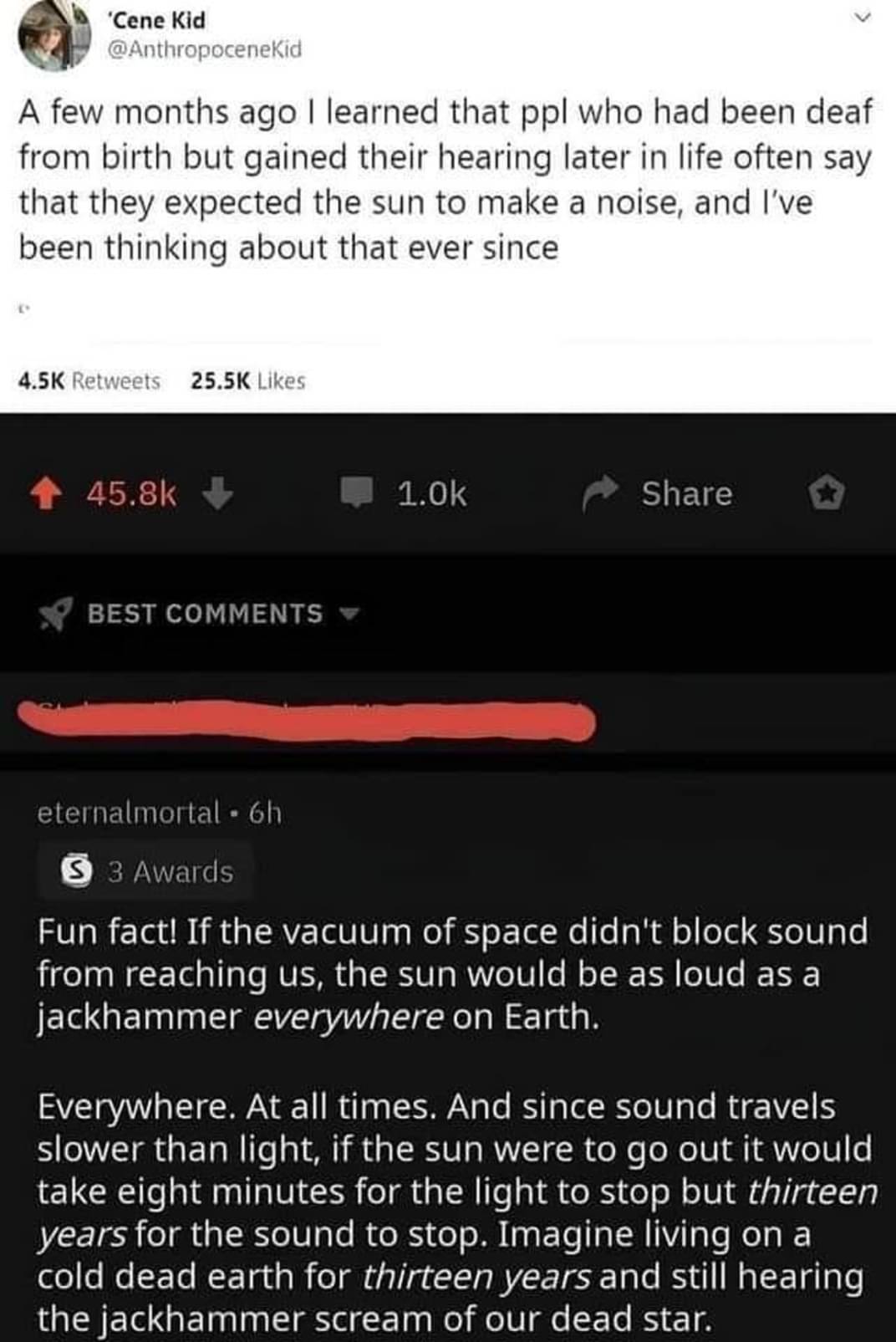
Science Memes
Welcome to c/science_memes @ Mander.xyz!
A place for majestic STEMLORD peacocking, as well as memes about the realities of working in a lab.

Rules
- Don't throw mud. Behave like an intellectual and remember the human.
- Keep it rooted (on topic).
- No spam.
- Infographics welcome, get schooled.
This is a science community. We use the Dawkins definition of meme.
Research Committee
Other Mander Communities
Science and Research
Biology and Life Sciences
- [email protected]
- [email protected]
- [email protected]
- [email protected]
- [email protected]
- [email protected]
- [email protected]
- [email protected]
- [email protected]
- [email protected]
- [email protected]
- [email protected]
- [email protected]
- [email protected]
- [email protected]
- [email protected]
- [email protected]
- [email protected]
- [email protected]
- [email protected]
- [email protected]
- [email protected]
- [email protected]
- [email protected]
- !reptiles and [email protected]
Physical Sciences
- [email protected]
- [email protected]
- [email protected]
- [email protected]
- [email protected]
- [email protected]
- [email protected]
- [email protected]
- [email protected]
Humanities and Social Sciences
Practical and Applied Sciences
- !exercise-and [email protected]
- [email protected]
- !self [email protected]
- [email protected]
- [email protected]
- [email protected]
Memes
Miscellaneous
 #
#
I can hear this image
I scrolled slow and mentally imagined it.
Just one small hitch: if there was an atmosphere in space dense enough to carry sound, the earth would burn up in minutes.
And apparently it would be quite loud during the burning!
Well yeah, I wouldn’t expect people and other animals to be quiet while the entire planet is burning up.
Ah, so this isn't tinnitus, I can actually hear the sun!
That or you’re standing next to a jackhammer.
Oh hey, thanks! Been hearing it for years, turns out I just never look left!
I wish they'd give me my driver's license back...
I imagine it would be kind of like the hypnotoad sound
Evolution would say: nope. And the surviving class would be deaf. No one is able to accept a permanent jackhammer.
Evolution might just block out certain frequencies. No need to go completely deaf.
Like the frequency dying plants make? Makes sense. Looks like evolution could already did this in the past.
Wait you mean you guys can't hear that?
Or evolve the ability to echolocate with the reflections of the background noise. Like our eyes does with light.
the sheer scale of the universe makes me want to get into astronomy.
Oh boy! YouTube suggestions for you!
- Astrum
- PBS space time*
- scishow space
- History of the universe******
- Coolworlds*
- Arvin Ash
- Paul Sutter*
- Startalk
- Kurzgesagt*
My favs are starred
Do it! It's a fantastic science, with ever expanding horizons! That being said, if working in the field is a bit too much, amateur astronomy is a fabulous and friendly hobby - if a bit expensive
It’s a fantastic science, with ever expanding horizons!
Pun appreciated.
If the sun were to go out it would take 8 minutes for the light to stop but 13 years for the sound to stop.
Kind of like when you kill an enderman. 🤔
On the plus side, if we evolved on Planet Sunblaster then our hearing would have evolved to either dial down the volume or filter it out completely.
I mean we hear the sound of our blood rushing through the veins of our ears at all times, but our brain filters it out. That the "sound of the ocean" you hear when listening into a conch, it just amplifies the bloodwaves. Other fun stuff our brain does: Our eyes are actually perceiving the world upside down and with a blind spot right in the middle.
You wouldn't, of course. Hearing, the way we hear, in such an environment would be useless. We wouldn't have evolved that. This is like saying "ultraviolet radiation from the sun would be everywhere, all the time, can you imagine?" It is everywhere all the time, but as such it isn't a useful sense to possess, so we don't.
This also makes some very weird assumptions about what the sound would be like. If space were a medium sound could travel through then it would--like all mediums capable of carrying a sound wave--alter the wave in many ways. Intensity, frequency, etc. But since we don't know what kind of medium that would be, and since the comment doesn't posit any particular medium, we don't know what the sound would sound like or even how loud it would be.
I assume that this thought experiment posits a space filled with the same average density of particles found at ground level on Earth. Obviously such a thing is nonsensical, but it serves to illuminate one aspect of the raw power of the Sun that we ignore, because we're insulated from it by 93 million miles of vacuum.
By your logic, light isn't a useful sense to possess since it's everywhere all the time thanks to sunlight and moonlight, is that correct?
Actually, since ultraviolet radiation and light are both electromagnetic waves, they should be treated the same, shouldn't they? It's as if there could be a different reason why we can detect one but not the other.
Yes, and some animals (mostly birds iirc) do see UV. Boring brown/black birds aren't so boring in UV. I don't know the evolutionary pressure necessary for UV, but it could have developed. Red, for instance, is believed to have been useful for us to pick out berries. Wolves, being carnivorous, wouldn't necessarily need it, so see in yellow blue... or so I read as a theory a while ago.
When I was little, I thought the sound of cicadas came from the sun.
They always did seem to get louder when a wave of heat would roll over the area.
It does. We can't hear it, but it does.
Well, I think technically it doesn't. There's no medium to propagate pressure waves, so at no point would the mechanics of sound actually exist, I would think.
The sun itself is a medium that can propogate sound waves. Someone standing on the Moon could equally well make the case that there is no medium to propagate pressure waves from the Earth, so the Earth must not make a sound.
imagine ... hearing the jackhammer scream of our star
Sounds are a form of energy. If we were bombarded by sound waves for the entire existence of the planet, I assume life would have adapted to harness this abundant power source and made it instrumental to how we survive and thrive.
instrumental
Heh.
Noone would live for longer than a few weeks after the sun went out.
Noone is one tough mf. I wish more of us could be like him.
A bullet fired from a gun goes more or less at Mach 1, correct?
It's thirteen years to the sun at the speed of a bullet?
Spacecraft towards Mercury, or the Parker Solar Probe go much faster than that, take a few years to make it there, but they are doing so picking up speed in flybys of first Earth, then Venus, then Mercury, in several, ever tighter orbits.
It's both fun and illuminating to try and visualize these things in new ways. In this case, from the viewpoint of a bullet.
This seems like bullshit to me. I don't think the noise level of the sun is something we have solid data on
The sun apparently vibrates, but at frequencies too low to hear anyway. https://www.nasa.gov/solar-system/sounds-of-the-sun/
If it takes 13 years for sound how long would it take for us to reach the sun on a rocket


